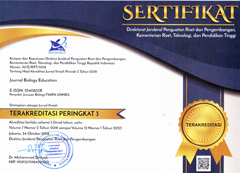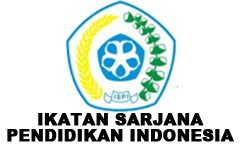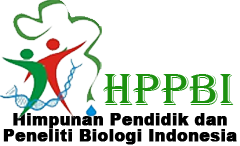PENGEMBANGAN SUPLEMEN PEMBELAJARAN BERBASIS POGIL PADA MATERI SISTEM PEREDARAN DARAH TINGKAT SMP
Abstract
The study is aimed to analyze the development process and effectiveness of learning suplement base POGIL in circulation system material. This is a Research and Development (R&D) work. The developed learning suplemen consist of students worksheet and learning videos, completed by syllabus and lesson plan as implementation guides. Learning suplemen base POGIL races students to find the material concept ourselves. There are question in students worksheet that guides students find concept by explore pictures, explanations, and videos. POGIL base learning promote students to develop essential skill, it is skill that important to interact in class. The developing process has several steps, it is problem and potension analysis, date collecting, product design, design validation, 1st revision, applied test, 2nd revision, usage test, 3th revision until established final product. Learning supplement judged by material expert and curriculum expert respectively with percentage 84,6% and 100% (very valid criteria). Learning supplement effective in used in learning process of Junior High School proved by student’s completeness is 88,7%; high-activities students is 98,15%; teacher opinion is very good (100%); and students opinion is very good (88,45%). Metacognition skill develop by student’s self assessment as indicator.
Â
Penelitian ini bertujuan untuk mengkaji proses pengembangan dan efektivitas suplemen pembelajaran berbasis Process Oriented Guided Inquiry Learning (POGIL) pada materi sistem peredaran darah tingkat SMP. Penelitian ini merupakan penelitian Research and Development (R&D). Suplemen pembelajaran yang dikembangkan terdiri atas LDS dan video pembelajaran, dilengkapi silabus dan RPP sebagai panduan pelaksanaan. Suplemen pembelajaran berbasis POGIL memacu siswa menemukan konsep materi dengan kemampuan sendiri. Pembelajaran berbasis POGIL memacu siswa mengembangkan kemampuan esensial, yaitu kemampuan untuk berinteraksi dalam masyarakat kelas. Pengembangan suplemen pembelajaran dilakukan melalui tahap analisis potensi dan masalah, pengumpulan data, mendesain produk, validasi desain, revisi I, uji coba keterterapan, revisi II, uji coba pemakaian, revisi III, dan menghasilkan produk final. Validator ahli materi dan ahli kurikulum menilai suplemen pembelajaran sangat valid berturut-turut dengan persentase 84,6% dan 100%. Suplemen pembelajaran yang dikembangkan efektif diterapkan dalam kegiatan pembelajaran di SMP. Hal tersebut dibuktikan dengan ketuntasan belajar siswa 88,7%; siswa yang beraktifitas tinggi 98,15%; tanggapan guru sangat baik (100%); dan tanggapan siswa sangat baik (88,45%). Kemampuan metakognisi berkembang dengan indikator siswa mampu melakukan kegiatan evaluasi diri..
References
Barten PGJ. 1999. Contrast Sensitivity of the Human Eye and its Effect on Image Quality. Knegsel: Uitgeverij HV Press.
Barthlow MJ. 2011. The Effectiveness of process guided inquiry learning to reduce alternate conception in secondary chemistry (Disertasi). Lynchburg:Liberty University.
Bilgin I. 2011. The effects of guided inquiry instruction incorporating a cooperative learning approach on university students’ achievement of acid and bases concepts and attitude toward guided inquiry instruction. Sci Res & Essay 4(10): 1038-1046.
Bransford JD, AL Brown & RR Cocking. 2004. How People Learn: Brain, Mind, Experience, and School. Washington DC: National Academy Press.
Derrick J. 2012. Embedding literacy and essential skills in workplace learning: breaking the solitudes. Cent Liter april: 3-39.
Grissom JB. 2005. Physical fitness and academic achievement. J Exer Physiol 8(1): 11-25.
Hanson DM. 2006. Instructor's Guide to Process-Oriented Guided-Inquiry Learning. Lisle:Pacific Crest.
Munoz A & ME Alvarez. 2007. Students’ objectivity and perception of self assessment in an ESL classroom. J Asia TEFL 4(2): 1-25.
Muslich M. 2007. KTSP Pembelajaran berbasis Kompetensi dan Kontekstual. Jakarta: Bumi Aksara.
Opara JA. 2011. Inquiry method and student academic achievement in biology: lesson and policy implications. American-
Eurasian J Sci Res 6(1): 28-31.
Opara JA & NS Oguzor. 2011. Inquiry instructional metod and the school science curriculum. Cur Res J Soc Sci 3(3): 188-198.
Peterson SS. 2010. Improving student writing using feedback as a teaching tool. What Works? Res into Prac October: 1-4.
Shahrori M. 2012. The relationship between happiness and academic achievement from Hae’l University Students, Perspective in the Kingdom of Saudi Arabia. Europan J Soc Sci
(1): 59-68.
Sugiyono. 2008. Metode Penelitian Kuantitatif, Kualitatif dan R & D. Bandung: Alfabeta.
The copyright of the article once it is accepted for publication shall be assigned to the journal as the publisher. The intended copyright includes the right to publish the article in various forms (including reprints). The journal maintains the publishing rights to the published articles.
This work is licensed under a Creative Commons Attribution 4.0 International License.







